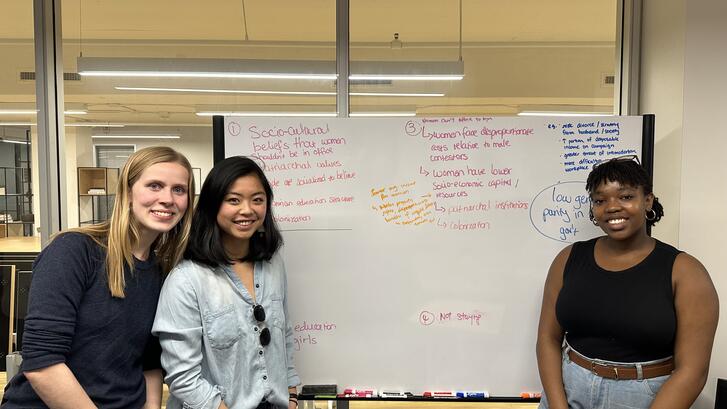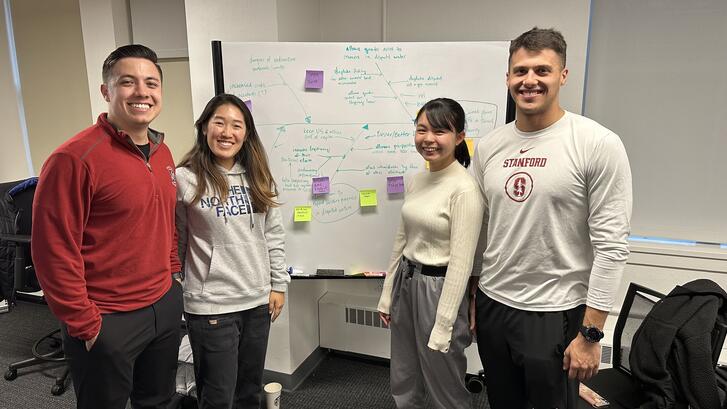The 2023 MIP Cohort Gears Up For Their Policy Impact Projects
The 2023 MIP Cohort Gears Up For Their Policy Impact Projects
The 2023 cohort of the Ford Dorsey Master's in International Policy are spreading out across the globe to practice their policymaking skills on issues such as women’s political representation in Ghana and food insecurity in Egypt.

After a year of book learning and studying theory, students from the 2023 cohort of the Ford Dorsey Master's in International Policy are getting hands-on with their policymaking skills.
During their second year of study, each of our master's students has the opportunity to participate in the Policy Change Studio, a pioneering program at the Freeman Spogli Institute for International Studies which pairs students with organizations across the globe to work on policy challenges in real-time.
From faba beans in Egypt to biotech at NATO and water management in Kenya, learn where our students are teaming up to make an impact, in their own words.
The Local Government Parity Puzzle in Ghana

The state, political parties, and CSOs in Ghana have recognized the importance of women’s political representation. This is seen in international conventions, the 1992 Constitution, affirmative action bill proposals, and efforts to target direct participation of women. Women’s representation at the parliamentary level stood at 14.5% in the 2020 General Elections, its highest level over the past 30 years; however, women’s representation in local councils has declined from 10% in 2010 to 7.6% in 2019.
We aim to better understand the drivers of low political representation of women at the local level, with attention to sociocultural factors, education, financial barriers, and performance barriers. We are excited and humbled to work with CDD-Ghana on such a critical issue.
Barriers to SME Contributions to Food Security in Egypt
![Luis Sanchez, Taimur Ahmad, Jasdeep Singh Hundal, and Shiro Wachira [not pictured]](https://fsi9-prod.s3.us-west-1.amazonaws.com/s3fs-public/styles/727x409/public/2023-03/project2_egypt_luis_sanchez_taimur_ahmad_jasdeep_singh_hunda.jpg?h=71976bb4&itok=5SzVVhcF)
We have chosen faba beans because they are currently one of the most important protein sources in the market and in the Egyptian diet. The majority of faba beans in Egypt are imported and are highly price sensitive to fluctuations and global supply chain disruptions. Egypt is highly reliant on imported food, which creates a tenuous food security situation for its >100M citizens, and in particular, the ~27% poor living below the $3.20 poverty line. Currently, inability to produce adequate food exposes Egyptians (especially those in poverty) to chronic food insecurity.
Our team is super excited to work with our partner organization and the communities that will be part of our research. We look forward to enhancing our knowledge of food security and provide the most comprehensive solutions to our partners as well as all the stakeholders involved in the project.
Floating Nuclear Power Plants in the South China Sea

While proponents argue that floating nuclear power plants have climate, industrial and potential economic benefits, lack of safeguards and international regulations raise questions about the safety of these deployments. Moreover, the possibility of deployment in the disputed waters of South China Sea present a grave risk to sovereignty claims of Southeast Asian countries, and may accelerate further militarization of the South China Sea.
We are aiming to identify the key security risks of these plans, and to develop policy recommendations for concerned governments and stakeholders.
Responsible Use of Biotechnology in Security and Defense

To that end, we are working with the NATO Innovation Unit to define a strategic approach to these advanced technologies that ensures access to cutting edge capabilities, informed adoption, and responsible use. The advent of human-machine integration, genetic editing, and other forms of biological manipulation represents a new front in the global innovation race.
Water Resource Management in Kenya

Agriculture is the backbone of many developing countries, and smallholder farmers play a critical role in this sector. However, these farmers often face numerous challenges, from incomplete irrigation infrastructure, low-quality agriculture inputs (seeds, fertilizers, etc), to the lack of market linkages. By working with Nuru International, a non-profit organization that works to improve the lives of smallholder farmers by providing them with training and resources, we want to help create a more equitable and prosperous future for rural communities in Kenya.
Misinformation and Disinformation in the Pacific Islands

Following a rapid phase of digitization and social media adoption, Pacific Island nations are struggling to counter a large variety of mis- and disinformation that is being spread via online sources largely trusted by citizens. We aim to understand Fiji’s unique socio-cultural context in order to propose tailored solutions for increasing citizens’ ability to verify information.
Challenges in Policy Making and Financing of Paris Agreement Goals

Especially in the absence of significant public resources, current flows of private investment in the final sector toward climate change adaptation and mitigation measures are insufficient to support the efforts of developing nations to limit the impact of global warming to 1.5 degrees Celsius.
Our team will be examining two case studies, Switzerland and the Maldives, to provide context and insights on the reason for the lack of an established reliable funding mechanism to address climate change.and effective coordination of initiatives to operationalize solutions to combat climate change.
The Ford Dorsey Master's in International Policy
Want to learn more? MIP holds admission events throughout the year, including graduate fairs and webinars, where you can meet our staff and ask questions about the program.



